- Preferences


THE ESSAY EXAMINATION - PowerPoint PPT Presentation

THE ESSAY EXAMINATION
... separate sheet of paper for each answer ... 1101 mid-term. open book ... correct mla documentation. qualities of good essay. recognizing and ... – powerpoint ppt presentation.
- KNOW THE MATERIAL
- ATTEND CLASS
- STUDY CLASS NOTES AND ASSIGNED READINGS
- COME TO TEST WITH REQUIRED TOOLS
- BOOK (Kirszner)
- BALL-POINT PEN
- LINED PAPER
- THE INSTRUCTOR IS NOT EXPECTING ORIGINAL THINKING.
- THE EXAM-GIVER EXPECTS PROOF THAT THE STUDENT UNDERSTANDS MATERIAL COVERED IN THE COURSE.
- FOLLOW THE CONVENTIONS FOR EXCELLENT ESSAY WRITING--WHICH YOU KNOW.
- OBJECTIVE TEST PLUS ESSAY QUESTION OR QUESTIONS
- ESSAY QUESTION(S) ONLY
- TURN TO THE ESSAY SECTION FIRST
- READ ALL QUESTIONS AND DIRECTIONS
- SELECT QUESTION OR QUESTIONS TO BE ANSWERED
- UNDERLINE KEY TERMS
- NOTE THE LENGTH REQUIREMENT (S)
- FLIP THE QUESTION INTO THE OPENING SENTENCE OF THE ANSWER
- USE A SEPARATE SHEET OF PAPER FOR EACH ANSWER
- USE THE EXACT WORDING OF THE QUESTION
- INCLUDE A NUMBER
- INCLUDE A QUALIFIER
- RESPOND TO ORGANIZATIONAL PATTERN REQUIRED BY QUESTION
- What were the causes of the French Revolution?
- There were ___ () main causes for the French Revolution.
- Qualifiers basic, critical, principle, significant, primarily
- ____ enter the final when youve finished your answer
- Pattern Analysis (causes or reasons why)
- SET ASIDE PAPER FOR NOTES
- TAKE THE OBJECTIVE PORTION OF THE TEST
- MARK ANY SPECIFICS USEFUL FOR THE ESSAY ANSWER
- JOT NOTES AS YOU BEGIN TO REMEMBER OTHER SPECIFICS FOR THE ESSAY QUESTION(S).
- Complete the easiest answer first
- Employ the qualities of a good essay
- clear organization with transitions
- adequate evidence with lots of specifics
- strong basic skills, standard diction, and sophisticated sentence structure
- For a long answer (20 minutes), use the 5-paragraph format with a thesis paragraph and topic sentences.
- For short answer (5 to 10 minutes), the instructor is calling for one paragraph with a strong topic sentence.
- Leave time to proofread.
- Anticipate Skills Tested
- Tab your handbook on key pages (Works Cited)
- Review course notes and anticipate questions based on mid-term review
- Descriptive Writing
- Correct MLA Documentation
- Qualities of Good Essay
- Recognizing and Using Effective Evidence
- Critical Thinking Skills
- EXTRACT 3 PIECES OF EVIDENCE FROM A SOURCE AND WRITE A PARAGRAPH.
- RESPOND TO A QUESTION USING THE RESEARCH AND CONCLUSIONS FROM YOUR CAREER ESSAY.
- REFLECT ON THE ROLL OF TECHNOLOGY IN THE COMPLETION OF YOUR CAREER ESSAY.
- REFLECT ON YOUR IMPROVED CORE SKILLS.
- Use Writing Sample
- Refer to 21ST Century Skills
PowerShow.com is a leading presentation sharing website. It has millions of presentations already uploaded and available with 1,000s more being uploaded by its users every day. Whatever your area of interest, here you’ll be able to find and view presentations you’ll love and possibly download. And, best of all, it is completely free and easy to use.
You might even have a presentation you’d like to share with others. If so, just upload it to PowerShow.com. We’ll convert it to an HTML5 slideshow that includes all the media types you’ve already added: audio, video, music, pictures, animations and transition effects. Then you can share it with your target audience as well as PowerShow.com’s millions of monthly visitors. And, again, it’s all free.
About the Developers
PowerShow.com is brought to you by CrystalGraphics , the award-winning developer and market-leading publisher of rich-media enhancement products for presentations. Our product offerings include millions of PowerPoint templates, diagrams, animated 3D characters and more.

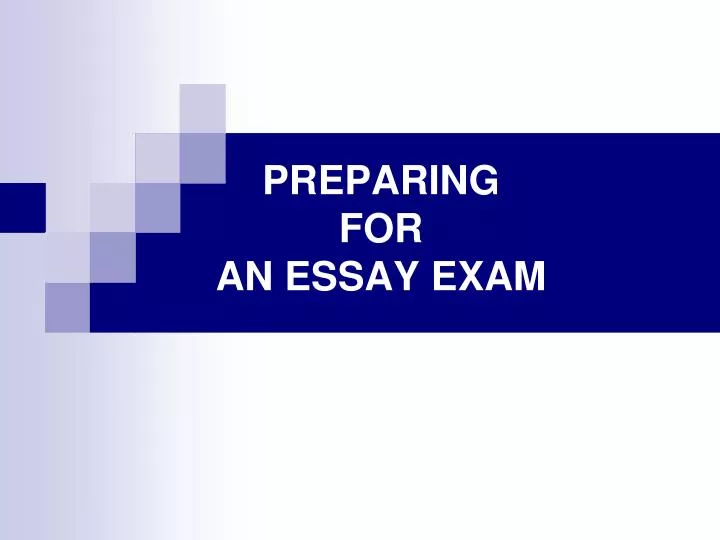
PREPARING FOR AN ESSAY EXAM
Mar 19, 2019
430 likes | 601 Views
PREPARING FOR AN ESSAY EXAM. How to write an effective essay exam: Read through all the questions carefully. Budget your time and decide which question (s) you will answer first. Underline the key word (s) which tell you what to do for each question.
Share Presentation
- rocess analysis
- vocational education
- effective essay exam
- essay involves giving directions

Presentation Transcript
How to write an effective essay exam: • Read through all the questions carefully. • Budget your time and decide which question(s) you will answer first. • Underline the key word(s) which tell you what to do for each question. • Choose an organizational pattern appropriate for each key word and plan your answers on scratch paper or in the margins. (See Specific Organizational Patterns below)
Begin each answer with a thesis which summarizes your answer. If possible, phrase the statement so that it rephrases the question's essential terms into a statement. • Write your answers as quickly and as legibly as you can the first time so that you do not waste time to recopy later. • Support your thesis with specific references to the material you have studied. • Proofread your answer and correct errors in spelling and mechanics.
1. Analyze the question: • Subject matter or topic. • Aspect or focus. • Instruction or comment.
To analyze a question, follow the following steps: a. Identify the topic. b. If the topic has a restriction or expansion, identify it. c.Search for the aspect. This is the angle or point of view on the subject matter. Often, the aspect is a phrase ending in 'of', e.g. 'the importance of', 'the contribution of'. d.Identify the instruction(which often comes at the beginning) and decide what it means and what it requires you to do. • Analyzethe changes inUS policy towards Iraqduring the 1990’s. instruction aspect topic restriction
2. Plan out your answer before you start writing Before you begin writing, spend five minutes making a brief outline to organize your thoughts. Then rephrase the question into a thesis as in the following example: Instruction: Explain three effects that the war in Iraq had on Turkey. Topic Sentence : “The Iraq War had three major effects on Turkey.”
3. Convey your ideas in an organized manner. -State the key points to your answer clearly, -Do not write anything irrelevant.
4. Support your answer with examples from class lectures and reading. Some instructors and styles of tests require detailed descriptions of examples that were discussed in class.
SPECIFIC ORGANIZATIONAL PATTERNS There are six most common organizational patterns for essay exams: 1.Definition, 2. Classification, 3. Cause and effect, 4. Comparison and contrast, 5. Process analysis, 6. Argumentation.
1. DEFINITION • Typical questions • “Define ….” • “What is a (n) …?” • “What does … mean?” • “What is meant by …?” • “How does … define …?” • Example • Q: “What is a termite?” • A: A termite is an antlike social insectthat feeds on wood. • term broad category distinguishing feature(s)
2. DIVISION AND CLASSIFICATION Typical questions • “Analyze …..” • “What are the components of …?” • “What are the five different kinds of …?” • “Discuss the different types of ….” • “What types of/kinds of …?” • “Classify …” • “Discuss the most important features of …”
Example: • Q: “Discuss the different services a junior college offers a community.” • A: TS: A junior college offers the community at least three main types of educational services: vocational education for young people, continuing education for older people, and personal development for all individuals. • Outline for supporting details and examples: -Vocational education -Continuing education -Personal development
3. CAUSE AND EFFECT Typical questions: • “What led to …?” • “Why did … occur?” • “Why does … happen?” • “What are/were the causes of …?” • “What are/were the effects of …?” • “What factors contributed to …?” • “What is the effect of …?” • “What have been the results/consequences of …?” • “What are the implications of …?” • “Discuss the reasons for…” • “To what extent is … true?” (This type of question requires an answer that discusses and explains in what ways … is true and in what ways … is not true.)
Example 1 Q: “Define recession and discuss the probable effects a recession would have on today's society.” A: Thesis: A recession, which is a nationwide lull in business activity, would be detrimental to society in the following ways: it would .......A......., it would .......B......., and it would .......C........ The rest of the answer would explain, in some detail, the three effects: A, B, and C. Example 2 Q: What are the effects of being the only child? A: Being the only child of a family results in ….A…., …B…., and …C…
4. COMPARE AND CONTRAST Typical questions: “How does X differ from Y?” “Compare X and Y.” “What are the advantages and disadvantages of X and Y?” “Compare … to …” “Contrast … with …” “Discuss the advantages of … over …” “What are the advantages/disadvantages of …?” “What are the major differences/similarities between … and …?”
Example: Q: “Which would you rather own--a compact car or a full-sized car?” A: Thesis: I would own a compact car rather than a full-sized car for the following reasons: .......A..., B..., C......., and .......D........
5. PROCESS ANALYSIS Typical questions “How does …X… work?” “Explain the process by which … X…” “Trace the developments of … X…” “Describe how … X… is accomplished.” “List the steps involved in … X….” “Explain what happened in … X….” “What is the procedure involved in …X…?”
This type of essay involves giving directions or telling the reader how to do something. It may involve discussing some complex procedure as a series of clear steps. The organization is almost always chronological. • Example • Q: “What is the best procedure for finding a job according to Richard Bolles' book called ‘What Color Is Your Parachute?’” • A: In ‘What Color Is Your Parachute?’, Richard Bolles lists seven steps that all job-hunters should follow: .....A....., .....B....., .....C....., .....D....., .....E....., .....F....., and .....G..... . • The remainder of the answer should discuss each of these seven steps.
6. ARGUMENTATION Typical questions: “Discuss ….” “A noted authority has said …. Do you agree or disagree?” “Defend or refute ….” “Do you think that … is valid? Defend your position.” Thesis and support involves stating a clearly worded opinion or interpretation and then defending it with data, examples, facts etc. which you can draw from the material you have studied.
6. ARGUMENTATION Example: • Q: Defend or refute the following statement: • “Television is useful because it helps in the socializing process of our children.” • A: Television hinders rather than helps in the socializing process of our children because .......A..., B......., and .......C........ • The rest of the answer is devoted to developing arguments A, B, and C.
A MINI-DICTIONARY of ESSAY EXAM INSTRUCTIONS ACCOUNT FOR: When you are asked to account for something, you need to give an answer that gives the reasons for the subject of the question. ANALYZE: When you are asked to analyze, you must separate a thing or idea into its parts to explain their relationship to each other. CLARIFY/ELUCIDATE: This requires an answer that explains what something means, makes it clear (lucid).
COMMENT: When you're asked to comment, you should explore the importance and meaning of something, or write a note of explanation, or write a criticism or example of something written or said. You may also write a remark or make a critical observation or express your opinion. • COMPARE: Here, you must look for similarities. The term compare is usually stated as compare with, and it means that you are to emphasize similarities, although differences may be mentioned. • CONSIDER: This requires an answer in which you describe and give your thoughts on the subject.
CONTRAST: Show the differences between two or more topics. • CRITIQUE/CRITICIZE: This requires an answer that points out mistakes or weaknesses, and that also indicates any favorable aspects of the subject of the question. Express your opinion with respect to the correctness or merits of the factors under consideration. Give the results of your own analysis and discuss the limitations and good points or contributions of the plan or work in question. • DEFINE: When asked to define something, your definition must contain concise, clear, and authoritative meanings. Details are not required, but boundaries or limitations of the definition should be given. Keep in mind the group/class/category to which a thing belongs and whatever differentiates the particular object from all others in the group/class/category.
DIAGRAM: You must draw a chart, a plan or a graphic representation in your answer. You may be expected to label the diagram or add a brief explanation or description. • DISCUSS: Examine the topic, analyze it carefully and then present detailed considerations pro and con regarding the problems or items involved. This type of essay question is very common. • EVALUATE/ASSESS: Present a careful analysis of the problem, and stress both the advantages and limitations. Evaluation means an authoritative and personal appraisal of both contributions and limitations. Give an answer that decides and explains how great, valuable or important something is. The judgment should be backed by a discussion of the evidence or reasoning involved.
EXPLAIN: This requires an answer that offers an explanation of an idea, a principle, or a set of reasons for a situation or an attitude. State the “how” or “why,” explain differences of opinion or results. • EXPLORE: This requires an answer that examines the subject thoroughly and considers it from a variety of viewpoints. • ILLUSTRATE/EXEMPLIFY: This requires an answer that consists mainly of examples to demonstrate or prove the subject of the question. It is often added to another instruction.
INTERPRET: Comment on a subject, giving your judgment about it. • LIST, ENUMERATE: Write an itemized list, series or tabulation. Be concise. • JUSTIFY: This requires an answer that gives only the reasons for a position or argument. Answer the main objections likely to be made of them. Note, however, that the proposition to be argued may be a negative one (e.g. Justify the abolition of the death penalty.)
OUTLINE: Give the main points and essential supplementary materials. Leave out the minor details and present the information in a clear systematic arrangement or classification. • PROVE/DISPROVE: Both of these require answers that demonstrate the logical arguments and/or evidence connected with a proposition: prove requires the 'pro' points, and disprove requires the 'con' points. • RELATE: Show the connection between the things mentioned in the question. Note that this does not mean to compare, so if you are asked to relate the American and French revolutions, you are not to compare them but to show how one influenced the other.
REVIEW: Provide a summary, usually a critical one. A review usually implies commenting on important aspects of the question. • STATE: It requires an answer that expresses the relevant points briefly and clearly without lengthy discussion or minor details. • SUMMARIZE: Give the main points or facts in condensed form. Brief examples can help make your summary more specific.
TRACE: It requires the statement and brief description in logical or chronological order of the stages (steps) in the development of e.g. a theory, a person's life, a process, etc. Describe the progress of some historical event or, where appropriate, describe the causes of an event.
Other Important Vocabulary Items That May Be Used in Questions • concept: an important idea • concise: short, brief • in the context of: referring to, inside the subject of • criteria: what standards you would expect; what questions you would expect to be answered
deduction: the conclusion or generalization you come to after looking carefully at all the facts • factor(s): the circumstances bringing about a result • function: what something does, its purpose or activities • implications: results that are not obvious, long term, suggested results, consequences
limitations/boundaries/shortcomings (of something): explain where something is not useful or not relevant • with/by reference to: make sure you write about the following subject • in relation to: only a certain part of the first topic is needed • role: what part something plays, how it works, especially in co-operation with others
scope: the area where something acts or has influence • significance: meaning and importance • valid/validity: is there evidence and are there facts to prove the statement?
TO SUM UP, a well written answer to an essay question is: • Well Focused • Well Organized • Well Supported
Task 1/1 Analyze the following questions: (i.e. What are the topic, instruction, aspect, and restriction/expansion?) 1. Discuss economies of scale. 2. Discuss the implications of the Milgram and Zimbardo experiments for understanding people's behavior in situations involving authority. 3. Analyze the process of transition from a command economy to a market economy, drawing upon the many recent examples. 4. Define Administrative Law indicating its general scope and function. 5. To what extent does the Turkish public participate in the political process?
Task 1/2 Analyze the following questions: (i.e. What are the topic, instruction, aspect, and restriction/expansion?) • 6. Some men seem unwilling to do what they consider women’s work. Explain possible reasons for this unwillingness. • 7. Explain each of the four key social and economic roles that businesses serve. • 8. Compare and contrast a joint venture to a strategic alliance. • 9. Discuss the advantages and disadvantages of trading blocs. • 10. Explain the factors which make international business a challenge.
Task 2 Look at the example below. Do the same for the following questions. • Example: Q: “How did Freud divide the human psyche?” a. Write a thesis statement. TS: Freud divided human psyche into three parts: the id, the ego, and the superego. b. What do you think the student should write next? Explain the id, the ego, and the superego in separate body paragraphs. c. What organizational pattern should this essay follow? Classification
1. What are the three basic types of franchises? (They are product, manufacturing, and business-format franchises) • 2. What is market segmentation? (It is the process of dividing a market into homogenous groups in order to identify potential customers and to devise marketing approaches geared to their needs and interests)
3. What are the six steps of the strategic planning process? (1.develop a clear vision, 2.create a mission statement, 3. develop forecasts, 4. analyze competition, 5. establish goals and objectives, 6. develop action plans) • 4. What are the different types of departmentalization? (Functional, matrix, division, virtual)
5. What are the key tasks involved in designing a production process? (Prepare production forecasts, plan for capacity, determine facility location, design facility layout, and develop a master production schedule) • 6. What seems to be the source of aggression in human beings?
7. What is meant by the term nonverbalcommunication? Give some examples of different types of nonverbal communication. • 8. Should life be sustained artificially?
9. What types of problems is Turkey facing right now? (Social, political, and economic) Which one is the most difficult to solve? Why? • 10. Do arranged marriages have any place in modern societies?
- More by User

Preparing for the Board Exam
Preparing for the Board Exam. Frederick L. Locke, M.D. Chief Medical Resident Detroit Receiving Hospital. Preparing for the Board Exam. Timing Focus Practice Materials. Timing. Begin NOW Organize your time Make a schedule… revise it as you go
407 views • 16 slides

Preparing for Exam
?????????? ???????????? ????? ??????????? ?? ? ???????? 17. ???????? ???? ?????? ? ???????. ???????????, ?????? ????? ?????? ???? ???. ? ??????? ???? ????????? ??????. . A.Last Minute OfferB.Best Catches Without MistakesC.Package HolidayD.Summer Holiday for Independent TravellersE.Educat
200 views • 5 slides

Preparing for the Essay Exam
What makes a well-written essay exam?. It is focused.Be sure to answer the question completely?make sure you address all parts. Avoid "padding." A lot of rambling and ranting signals that the writer doesn't really know the answer.. What makes a well-written essay exam? . It is well-organized.Don'
459 views • 29 slides
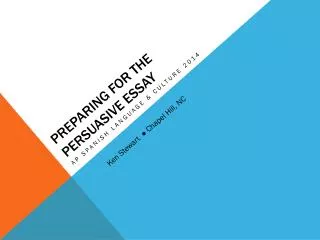
Preparing for the Persuasive essay
Preparing for the Persuasive essay. AP SPANISH LANGUAGE & CULTURE 2014. Ken Stewart ● Chapel Hill, NC. How can I express my opinion in a convincing way?. A persuasive essay is like charming someone: build your case forcefully and intelligently without offending them. GUIDELINEs.
203 views • 10 slides
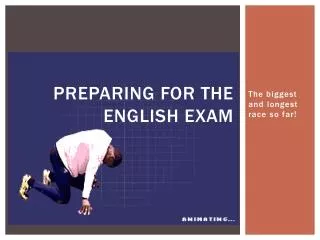
Preparing for the English Exam
Preparing for the English Exam. The biggest and longest race so far!. READY . . . . Preparing for the English Exam:. One Week Before: Section A: READING AND RESPONDING Know BOTH texts AFTA (Hemingway) and Cosi (Nowra) Section B: CREATING & PRESENTING Know BOTH texts
652 views • 10 slides

PREPARING FOR AN EXAM
PREPARING FOR AN EXAM Plan a revision timetable. DO NOT wait until last minute to study. Study in advance, using the night before an exam to refresh your memory. Condense notes - 1 page per topic. Use concept maps, flow diagrams, etc. to link ideas .
399 views • 6 slides
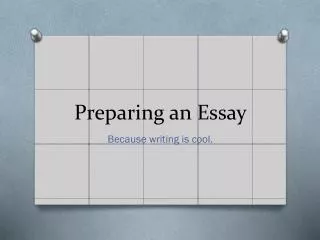
Preparing an Essay
Preparing an Essay. Because writing is cool. Outline. The purpose of an outline is to organize your thoughts. You should tailor make your outline to the type of essay your are preparing. Just remember these simple rules: Roman numerals indicate topics Letters indicate examples
393 views • 13 slides
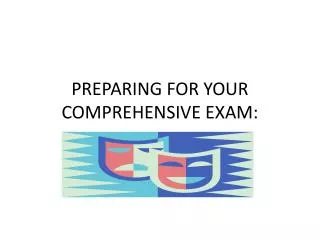
PREPARING FOR YOUR COMPREHENSIVE EXAM:
PREPARING FOR YOUR COMPREHENSIVE EXAM: . Workshop Objectives. 1. Determine needs and concerns 2. Review the EDST comprehensive policy 3. Explore options for the format of the exams 4. Review some examples 5. Begin to plan. The Comps: A Road Frequently Travelled.
239 views • 8 slides
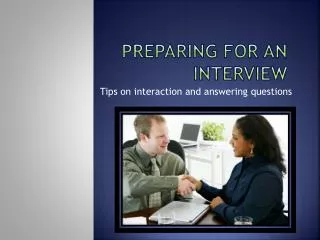

Preparing for an interview
Preparing for an interview. Tips on interaction and answering questions. Interaction Techniques. Let’s look at behaviors that are favorable while an interview is taking place. Be on time!. OBVIOUSLY. Actually, be 10-15 minutes early Know where you need to be and when you should be there.
393 views • 23 slides
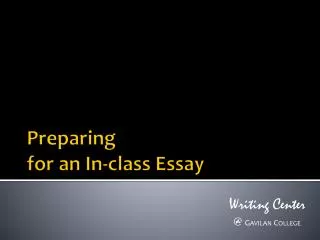
Preparing for an In-class Essay
Preparing for an In-class Essay. Writing Center @ Gavilan College . What are you being asked to do?. Understand and restate the author’s argument. Give your opinion on whether you agree or disagree with the author’s argument.
243 views • 13 slides
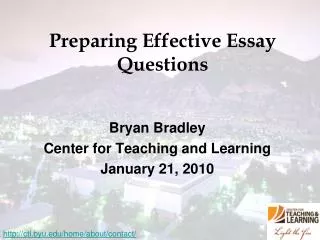
Preparing Effective Essay Questions
Preparing Effective Essay Questions. Bryan Bradley Center for Teaching and Learning January 21, 2010. http://ctl.byu.edu/home/about/contact/. Focus:. Focus on essays as a way to assess thinking and reasoning;
764 views • 21 slides
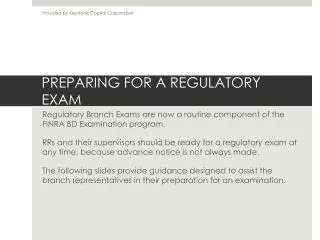
PREPARING FOR A REGULATORY EXAM
PREPARING FOR A REGULATORY EXAM. Regulatory Branch Exams are now a routine component of the FINRA BD Examination program. RRs and their supervisors should be ready for a regulatory exam at any time, because advance notice is not always made.
281 views • 5 slides
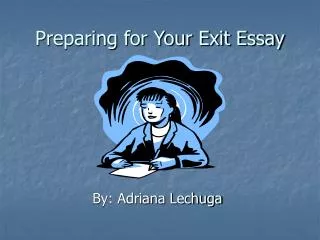
Preparing for Your Exit Essay
By: Adriana Lechuga. Preparing for Your Exit Essay. When You Receive Your Essay Topic. Brainstorm And/Or Make An Outline Decide On a Thesis Statement i.e. (Your Position, Argument, Stand On the Topic). Writing the Introduction. Introduction Should Have About 3-5 Sentences
235 views • 13 slides
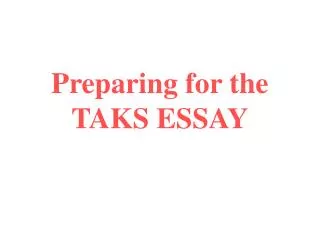
Preparing for the TAKS ESSAY
Preparing for the TAKS ESSAY. Content / Ideas.
320 views • 23 slides

Preparing for an In-class Essay. Writing Center @ Gavilan College. What are you being asked to do?. Understand and restate the author’s argument. Give your opinion on whether you agree or disagree with the author’s argument.
303 views • 12 slides
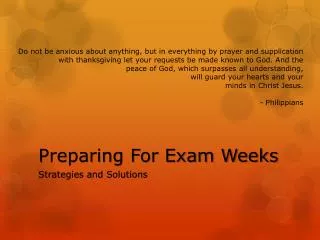
Preparing For Exam Weeks
Do not be anxious about anything, but in everything by prayer and supplication with thanksgiving let your requests be made known to God. And the peace of God, which surpasses all understanding, will guard your hearts and your minds in Christ Jesus. - Philippians. Preparing For Exam Weeks.
295 views • 18 slides
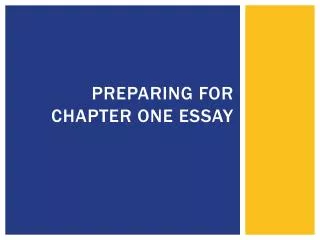
Preparing for chapter one essay
Preparing for chapter one essay. Using the ‘under the magnifying glass’ grids you completed yesterday…. You will now construct an ALAAL paragraph during the next 15-20mins. Remember BABOP as a way of extending your analysis: Because – a straightforward explanation will follow
157 views • 8 slides

Preparing for the CPA Exam
After pursuing your Master of Science in Accounting, you might be thinking of taking the CPA exam. Because a large portion of the CPAs will be eligible to retire by 2020, the industry is in need a new generation of certified accountants. The CPA exam, therefore, is a gateway to increasing opportunity. View More: https://onlinedegrees.nec.edu/resources/infographics/preparing-for-the-cpa-exam/
30 views • 1 slides
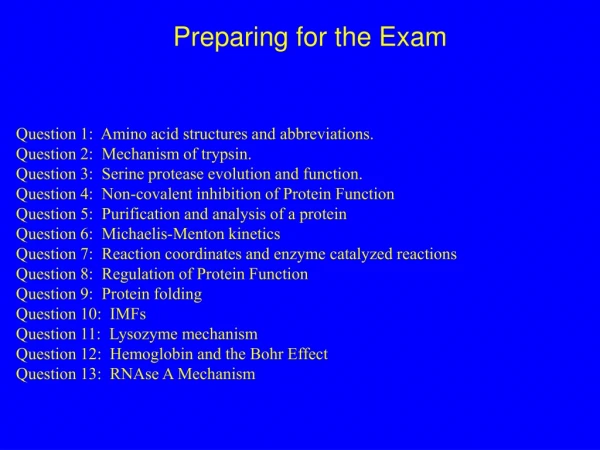
Preparing for the Exam
Preparing for the Exam. Question 1: Amino acid structures and abbreviations. Question 2: Mechanism of trypsin. Question 3: Serine protease evolution and function. Question 4: Non-covalent inhibition of Protein Function Question 5: Purification and analysis of a protein
295 views • 28 slides

Preparing for the Persuasive essay. AP SPANISH LANGUAGE & CULTURE 2014. Ken Stewart ● Chapel Hill, NC. How can I express my opinion in a convincing way?. A persuasive essay is like charming someone: build your case forcefully and intelligently without offending them. 5 steps to a 5….
117 views • 10 slides
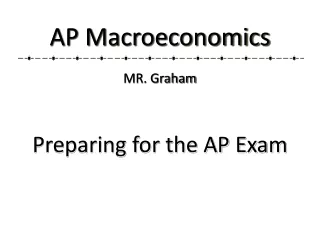
Preparing for the AP Exam
AP Macroeconomics MR. Graham. Preparing for the AP Exam. Module 44½: What to Expect on the AP Exam. 2. Multiple-Choice Section (2/3 of final score) 60 questions, 70 minutes Plan on answering 15 questions per 15 minutes— write timing on your test TIPS: Select the best answer
307 views • 29 slides
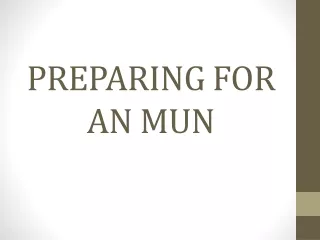
PREPARING FOR AN MUN
PREPARING FOR AN MUN. Preparing as a MUN delegate requires determination, research and organizational skills. The MUN is a simulation of the foremost international body, the United Nations. Model UN is an educational exercise, where individual exploration and hands-on learning are fundamental.
781 views • 16 slides
